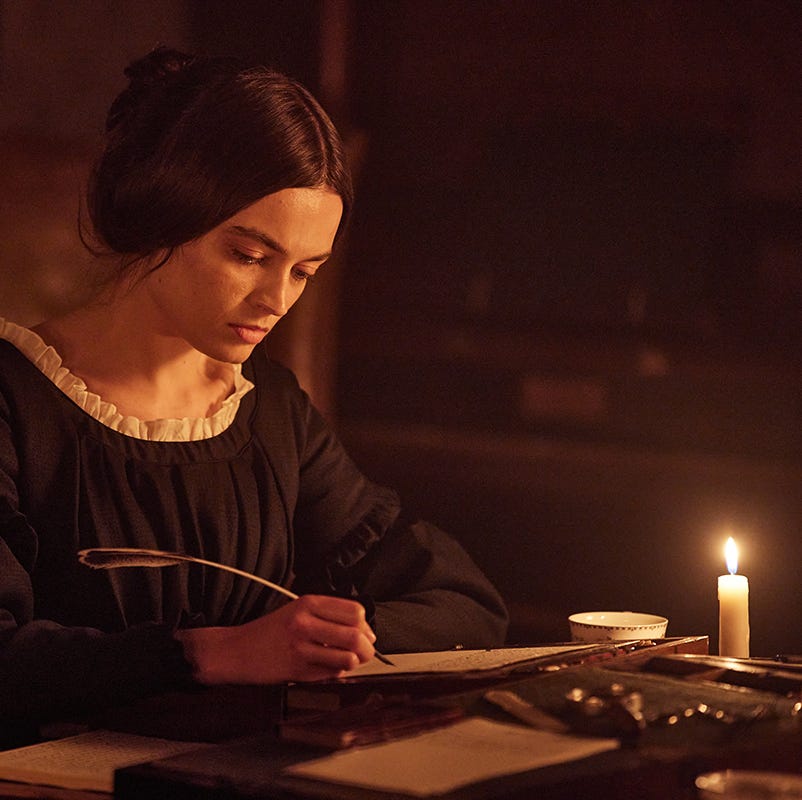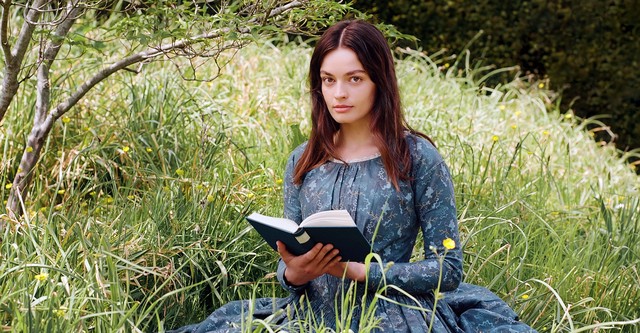
Loud blew the wind 'twas sad to stay
From all that splendour barred away
I imagined in the lonely room
A thousand forms of fearful gloom
And with my wet eyes raised on high
I prayed to God that I might die....
~ from "Come hither child" by Emily Jane Brontë
Although I said in the comments of an earlier post that I probably would not see the new Brontë biopic, curiosity won the day. I confess that, in spite of the film's frequent meanderings from historical veracity to pure fantasy, I did enjoy it. Filmed partly in Yorkshire, the viewer can see how the wind blown heaths and crags helped to shape the imaginations of the young ladies of the Haworth rectory. The soundtrack was particularly haunting, invoking the Celtic ancestry of the Brontë family. Indeed, their patriarch, Patrick Brontë, was born to an Irish Catholic mother and to a father whose dynastic name was mac Aedh Ó Proinntigh, which became Prunty. then Brunty, and finally, in England, Brontë. Their mother, Maria Branwell, was Cornish. The Celtic preoccupations with storytelling, mysticism, solitude, nature, madness, death, curses and the occult are prevalent in the tales of the Brontë sisters, most especially in Emily's Wuthering Heights. The film Emily does not mention the Celtic origins of the family; if it did it might help to explain the fiery, passionate temperaments which manifested themselves in various ways according to the personalities of each member of the clan. Instead the movie seeks to explain how a sheltered spinster like Emily Jane came to write such a passionate novel by assuming that she must have been having a secret love affair.
Although it may come as a surprise to the filmmakers, a person can experience passion without giving into it; the very suppression can make for heightened intensity, which was more than likely the case with Emily Brontë. Even in Wuthering Heights, the romance between Catherine and Heathcliff was probably never consummated, which appears to have made their thwarted love all the more consuming. Emily was in a situation where she had no outlet but her writing; even her religion was austere and stifling, without the music and drama, color and light, which made Roman Catholicism seem like paganism to low church Protestants such as the Brontës.
However, while there is no evidence that Emily had an affair with the young curate, and I do not believe she needed to have an affair in order to write Wuthering Heights, the film makes it seem like a possibility. One might wonder why, in the film, William could not just marry her first, but then it is made clear that Emily is an oddball and that she would make a terrible minister's wife. William is too prudent to ask for her hand yet she appeals to a side of him he seemed to be hitherto unconscious of, leading to assignations in the deserted cottage on the moors. His guilt separates them, along with the envy and lies of another character, creating the atmosphere of agony and tragedy in which Wuthering Heights is written.
What is fact and what is fiction in the film? From Collider:
ShareThere’s enough truth in Emily to prevent the story from being wholly unrecognizable. Just as Brontë did in real life, Emily in the film has three siblings: elder sister Charlotte (Alexandra Dowling), younger sister Anne (Amelia Gething), and brother Branwell (Fionn Whitehead). The three of them live in the moors of Haworth, Yorkshire, with their father, Patrick (Adrian Dunbar), a widower following the death of their mother, Maria Branwell, in 1821. Emily, of course, writes Wuthering Heights in the 1840s, and it’s also noted that Charlotte is a teacher and writer. The picture is structured around certain events that really did happen, such as Emily and Charlotte traveling to Brussels, and Branwell studying at the Royal Academy of Arts, as well as his addiction issues and early death. Emily, too, died tragically young, something that the film establishes as early as its opening scene before descending into flashbacks.
Emily’s introverted, eccentric personality in the film may be fairly accurate, as historical sources have regarded her as reserved and reclusive in nature. Emily’s love interest in the movie, Weightman, was also a real person and was the curate at the Brontë’s parish. But there is zero evidence to suggest that the real Emily Brontë and Weightman were ever close acquaintances or romantically involved; instead, historians sometimes speculate about a potential connection between Weightman and Anne. This is the biggest way in which the movie diverges from reality.
[...]
Brontë’s real story is fairly mysterious, and there are minimal sources out there that provide much information. It appears that when she wasn’t writing, she was often tutoring or studying, but romance was absent from her life. No stranger to disease and grief, it’s perhaps surprising that the filmmakers did not find enough basis for a compelling story rooted in Brontë’s reality. Those behind Emily clearly saw a lack of biographical content to adapt, and a gap in her personal life influenced them to envision what could’ve been, but due to her solitary character and more importantly, societal expectations, it is improbable that she ever had a relationship that resembled Emily and Weightman’s in the film. Scenes such as Emily and Branwell scaring a nearby family, and Emily acting possessed by her mother in an impersonation game, also have no basis in real life.
At the end of Emily, Emily’s death motivates Charlotte to take up writing herself; this is historically inaccurate as Charlotte was already a writer who published poetry collections with her sisters prior to Emily’s death, and Jane Eyre was in fact published before Wuthering Heights. Overall, the film does not try to examine issues surrounding the Brontë’s being female writers in the Victorian era, and does not even show how Wuthering Heights was originally published under a male pseudonym, Ellis Bell. This was a missed opportunity to present the internal and external challenges the sisters would’ve navigated before and after revealing themselves as women — though Wuthering Heights was not published under Emily’s real name until after she passed away. (Read more.)



















No comments:
Post a Comment